Getting kids to do household chores (ew) is a true brain teaser for many parents. Even with various reward systems, charts, endless talk-throughs, and constant reminders, it can be difficult to convince them to help out without losing one’s patience.
Redditor Odd_Hat_2030 even started wondering if there was something wrong with her son, who just couldn’t get the hang of simple chores. After finding out that he did it on purpose, she used similar logic to get back at him.
Convincing children to do chores can be a true brain teaser for parents
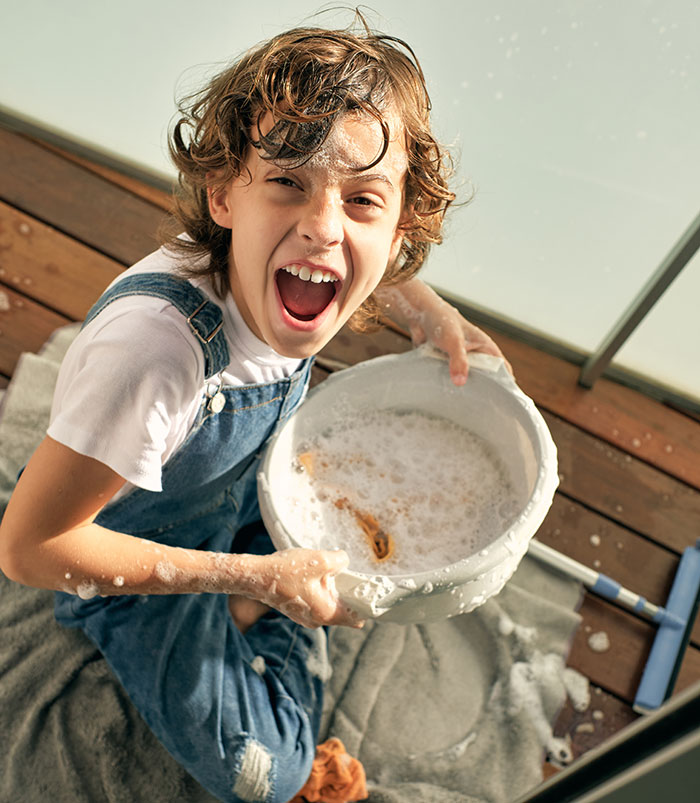
Image credits: ADDICTIVE_STOCK/Envato (not the actual photo)
This mom even started wondering if there was something wrong with her son, who couldn’t do them
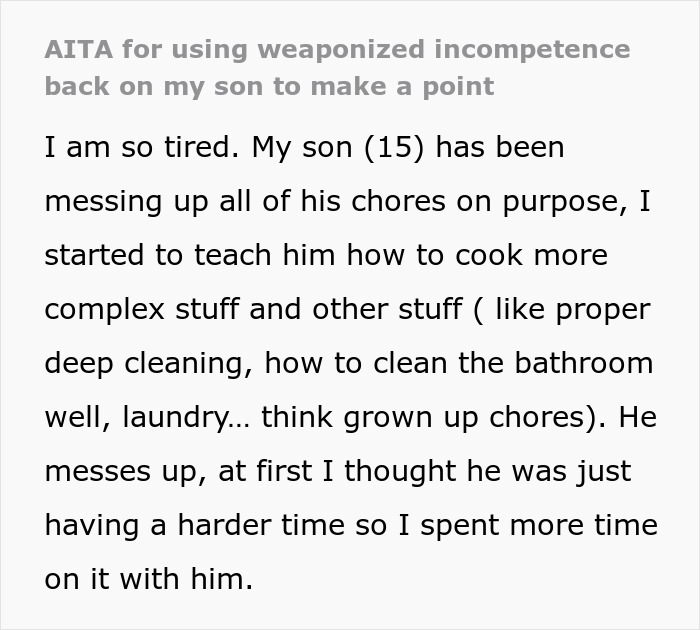
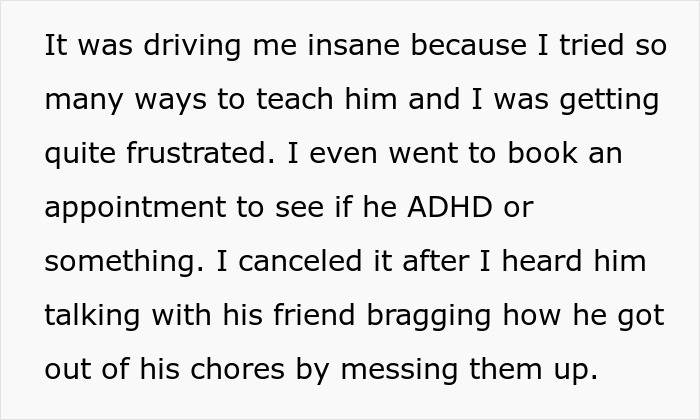

Image credits: LightFieldStudios/Envato (not the actual photo)


Image credits: Odd_Hat_2030
“Chores teach children how to do tasks that they will need throughout their lives — like doing laundry and the dishes”

Image credits: ADDICTIVE_STOCK/Envato (not the actual photo)
Children may not love the idea of doing chores; however, scientists suggest positive results for those who do them beyond having a clean house. Australian researchers found that children required to do household tasks were likelier to show better academic performance and problem-solving skills. Previous studies also revealed that children involved in house duties are associated with increased feelings of autonomy and greater life satisfaction.
“Chores teach children how to do tasks that they will need throughout their lives — like doing laundry and the dishes. And they teach skills that will benefit them in the classroom and on the sports field, such as how to work together and be a part of a team,” adds Caroline Mendel, PsyD, a clinical psychologist.
Experts say that the earlier parents start assigning housework to their children, the better. Little ones love to help them with whatever they’re doing. They see it as a game and a fun learning experience. Even if it takes them longer and they have to be supervised with certain tasks, many toddlers are already capable of carrying their plastic dishes to the dishwasher, wiping down counters, or handing utensils while a parent is cooking.
“When you start kids young, it becomes a fun thing working with Mom and Dad,” licensed family therapist Michael Ceely says. “They develop this sense of agency and contribution.”
The reason why kids don’t particularly enjoy doing chores is that they find housework dull and unimportant, as do many adults. Why would they want to wash dishes or do laundry when they have so many other exciting activities to attend to? But unlike a grown person, they aren’t yet as mature to push through their frustrations and complete the tasks at hand. Therefore, parents are there to help and guide them.
Making chores more fun and adding a reward at the end may boost their motivation

Image credits: prostooleh/Envato (not the actual photo)
“So how do I motivate my child to get involved with the housework?” the restless parents might be asking. Well, it’s a good idea to start with one of the most common mistakes they make that discourages kids and teenagers from wanting to participate.
That is constantly reminding them about their tasks, or “nagging.” The kid most likely won’t leap into action after they’ve been told to do it 5 times, knowing that they probably won’t be held accountable. What might help is changing the course of action that captures the child’s attention.
If the goal is to get the kids to finish their assigned tasks on time, setting a time limit might do the trick. For example, parents can ask them to finish tidying their rooms in 20 minutes. They can also offer an “If…then” statement to introduce them to potential consequences. They might try saying, “If you don’t get the bathroom cleaned before bed, then you won’t be allowed to use your electronics tomorrow.”
When a kid needs a reminder, parents are advised to give one at the beginning and stop at that. It’s their choice to follow through with their tasks or face the consequences. In any case, it’s best to avoid lecturing or shaming them, but it should be clear that chores have to be done in the future if they want to retain their privileges.
Making it more fun and adding a reward at the end may boost their motivation. For instance, parents can say, “If you finish the task in 15 minutes instead of 20, you can watch TV or play with your siblings for 15 minutes more.”
Something else that might help is to make chores a part of a routine, as the structure is very grounding for kids. The children also should be told about tasks up front (or put in a chore chart) and given some choices between setting the table or clearing it, for example.
“Children want to feel a little bit in control,” parenting psychologist Dr. Bethany Cook says. “They’re going to be more engaged in the process and feel accountable.”
If the kids are still small, it might help to assign them concrete tasks like tidying their Legos into the box or putting books back on the shelves instead of telling them to clean their room. Finally, the tasks should be age-appropriate, and when they’re finished, the parents have to ensure that the little ones feel pride and joy over their accomplishments, so they’ll want to achieve them again!
The author provided more information in the comments
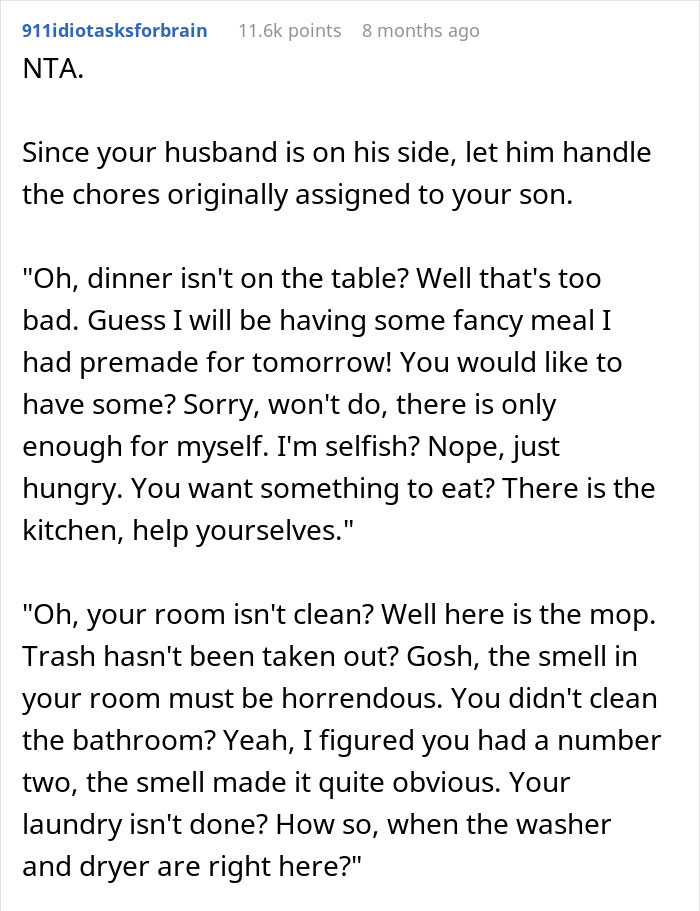
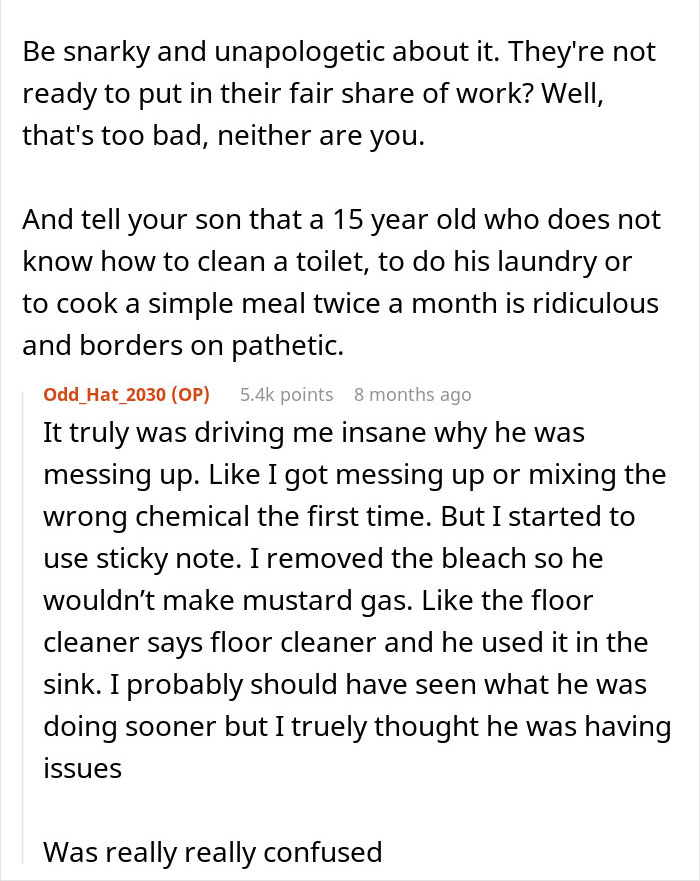

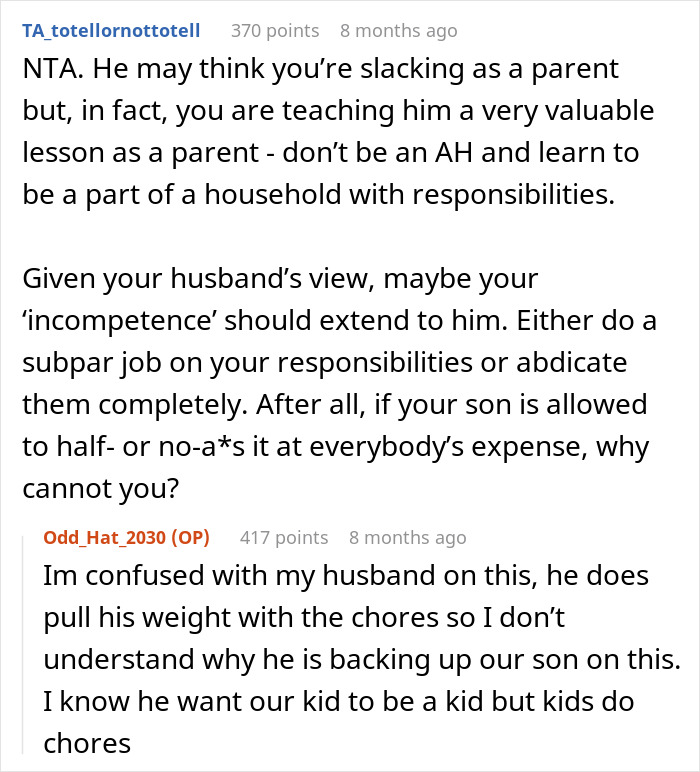

Readers had a lot of mixed opinions, some saying that the mother’s behavior was justified

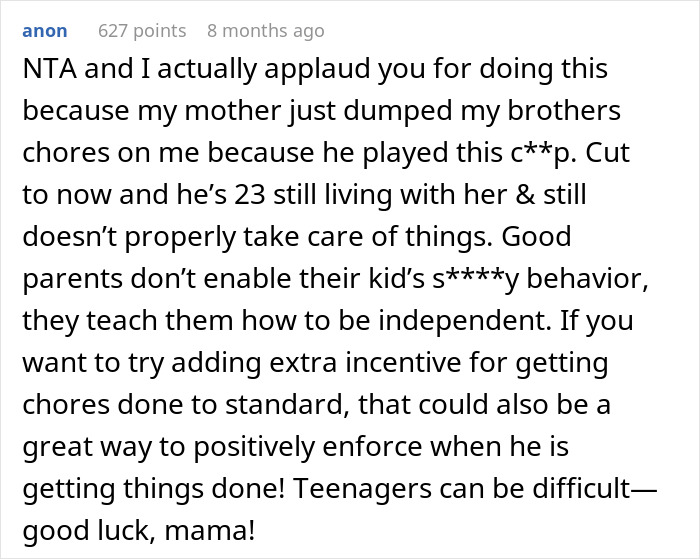





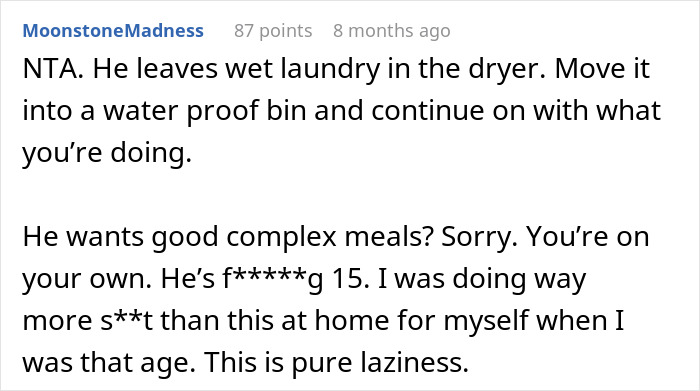




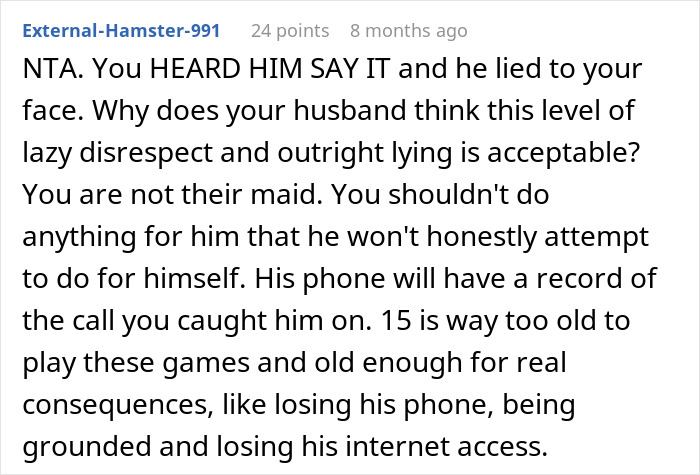


Others believed that her weaponized incompetence was wrong
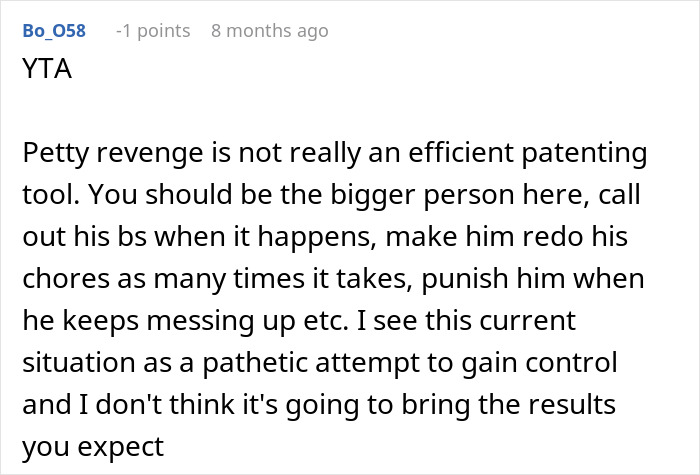


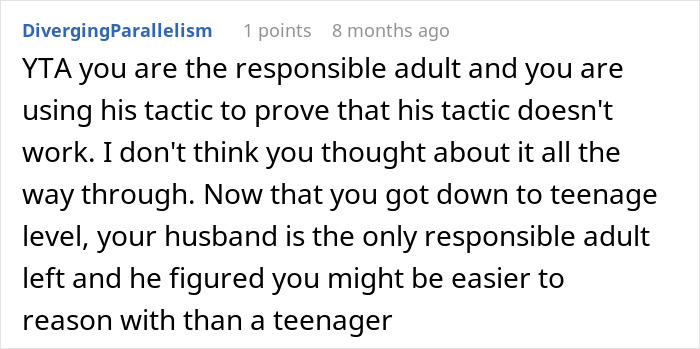

Meanwhile, some saw both sides as wrong

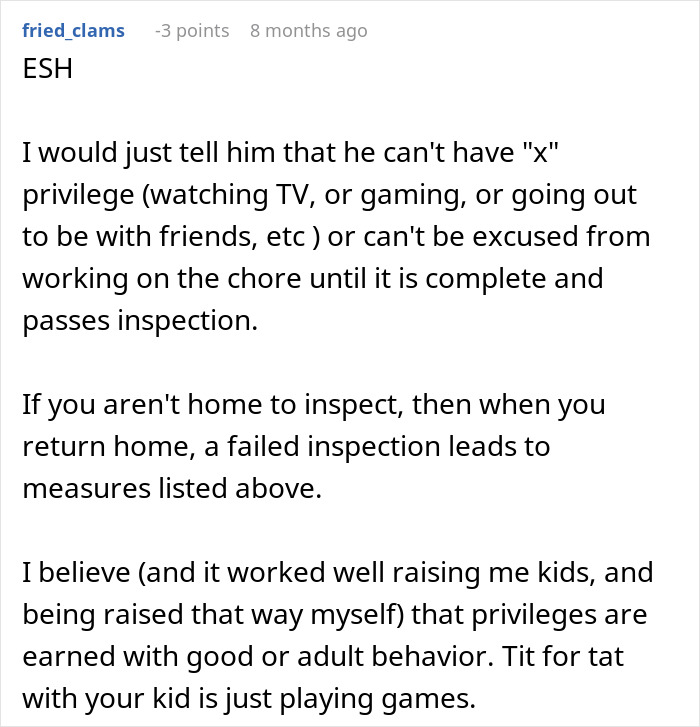

The post Mom Finds Out About Son’s “Genius” Plan To Get Out Of Chores, Teaches Him A Lesson first appeared on Bored Panda.
from Bored Panda https://ift.tt/ZbJyVA3
via IFTTT source site : boredpanda